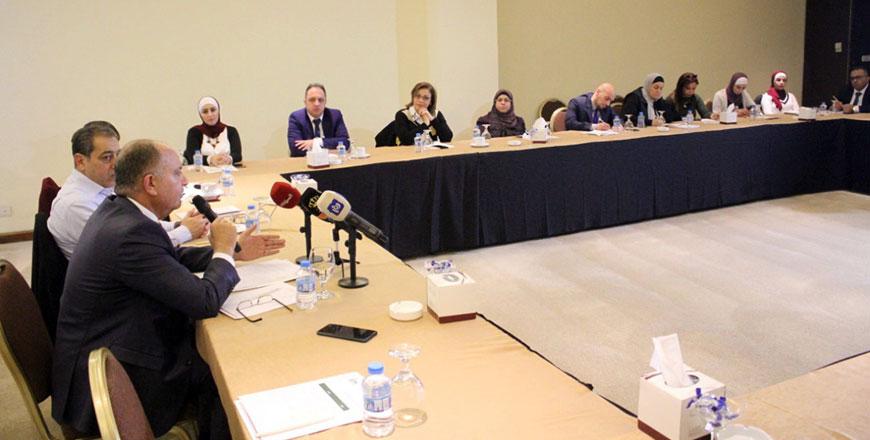You are here
Media advocacy group denies accusations of illegal actions
By Rana Husseini - Sep 13,2017 - Last updated at Sep 13,2017
AMMAN — The Centre for Defending Freedom of Journalists (CDFJ) on Wednesday said they never violated any law and their work has always been “transparent and aimed at defending the freedoms and rights of journalists”.
“Our legal position is very strong and we have never violated the law for over 20 years,” CDFJ President Nidal Mansour said.
Mansour was referring to a notification sent to the centre by the Company’s Control Department (CCD) in March asking “us [CDFJ] to stop taking external funding and to stop claiming that we are a non-profit organisation, which we never did”, Mansour added.
“We have been working under the registration of a civil company since 1998 and our work has been transparent. We have always adhered to the laws and have never received any official notification to change our status,” Mansour told The Jordan Times.
He added that officials from the CCD visited the offices of CDFJ in June and “were provided with the necessary documents and answers to all their inquiries and we never heard from them again”.
Mansour noted that “the CDFJ was surprised two days ago [on Monday] when news surfaced in a local daily that the company was referred to the general prosecutor’s office.”
“It is outrageous and we were never properly notified of such a procedure. We learnt that from the press, then received official notifications the following day,” the director explained.
Furthermore, he added, “referring our centre to the general prosecutor does not necessarily mean that we will be legally prosecuted. It is up to the prosecutor to summon us or just drop the case depending on the findings.”
Mansour charged that the step taken by the CCD was “part of a wider campaign that targets civil society organisations”.
“It is strange that, after 20 years, the CCD decides now to send us a notification stating that our case was referred to the authorities. I believe it is just another step to suppress the work of the civil society in Jordan,” Mansour charged.
This is clearly a violation of constitutional rights and a “contradiction to Jordan’s international obligations stated in international treaties ratified by the Kingdom”, Mansour added.
CCD Director Ramzi Nuzha was unavailable to comment on the issue despite repeated attempts by The Jordan Times.
Jordan Press Association President Rakan Saaideh told The Jordan Times that “this case is in the hands of the judiciary and we respect the law and cannot comment on the case.”
Meanwhile, several individuals and human rights organisations voiced their support for the work of the CDFJ via social media.
Journalist Ghada Sheikh expressed her solidarity with Mansour’s centre, stating on her Facebook page that “his centre is the centre for all journalists”.
Journalist Nidal Faraneh also said that “Mansour and his centre had very positive roles with all journalists and we should all stand with the centre and support its work.”
Wahid Qarmash also expressed his disapproval of the recent move against the CDFJ, posting: “Unfortunately, there is a strong resistance against the work and role of the civil society.”
Meanwhile, US-based Human Rights Watch (HRW) group issued a statement denouncing the recent action against the CDFJ stating that “vague and restrictive laws hamper freedom of association”.
HRW said that CDFJ has worked on behalf of journalists detained across the region and hosts annual workshops and events on media freedom.
“The Jordanian authorities’ treatment of this media freedom group indicates that they view some nongovernmental organisations as enemies that must be controlled rather than as partners in improving the country’s human rights situation,” said Sarah Leah Whitson, Middle East director at HRW.
The move against the group could place dozens of organisations registered as companies at risk, HRW added in its statement.
The laws require organisations registered as associations under the country’s 2008 Law on Associations or nonprofit companies under the Law on Companies to seek high-level government approval before receiving any foreign funding.
“Jordan should stop using foreign funding as a cudgel to punish organisations working to strengthen human rights and basic freedoms,” Whitson added.
Related Articles
AMMAN — The Centre for Defending Freedom of Journalists (CDFJ) on Tuesday expressed its rejection of the “Lower House’s attempts to restrict
AMMAN — The government is keen on enhancing the principles of partnership with all civil society institutions, Minister of State for Media A
Media professionals on Sunday called for holding a national conference to draw up a strategy to defend journalists and enhance the independence of the Jordan Press Association (JPA).












